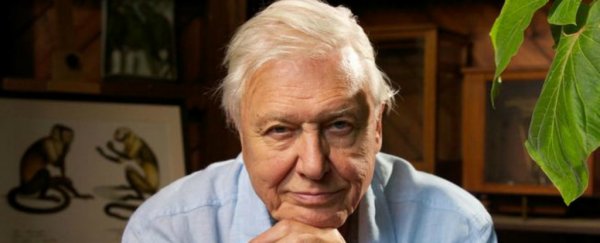If you don't know who Sir David Attenborough is, you know his voice. He's the man that has - over his 90 years of life - presented just about every awesome nature documentary out there, with his latest work being BBC's Planet Earth II.
When he isn't walking us through some of the most remote places on this planet, he's working with conservation organisations to keep the planet fit for future generations, and one his most outspoken and controversial views is on population.
The idea is that we humans need to start limiting our population growth, because we are becoming a 'plague' on our own planet, and soon we'll be incapable of feeding or housing ourselves.
"We are a plague on Earth. It's coming home to roost over the next 50 years or so. It's not just climate change; it's sheer space, places to grow food for this enormous horde," Attenborough told Radio Times back in 2013.
"Either we limit our population growth, or the natural world will do it for us, and the natural world is doing it for us right now."
Attenborough is also a supporter of the UK-based charity Population Matters, which advocates for sustainable population growth to keep the environment - and the people who live in it - healthy for the future.
According to Attenborough, the best ways of doing this would be to increase sex education around the world, and give women more political control over their bodies.
"The only straw of comfort or of hope, and even that is pretty fragile, is that wherever women are given political control of their bodies, where they have the vote, education, appropriate medical facilities and they can read and have rights and so on, the birth rate falls, there's no exceptions to that," Attenborough told Christopher Hooton at The Independent.
"There are still quite a lot of parts of the world where those things don't apply, so those of us who live in the parts where they do apply ought to help the others to have that possibility."
Attenborough doesn't shy away from adding a bit more controversy to an already difficult issue by saying that famine-stricken countries like Ethiopia have a population problem that is contributing to famine.
"We keep putting on programmes about famine in Ethiopia; that's what's happening. Too many people there," he told The Telegraph.
"They can't support themselves - and it's not an inhuman thing to say. It's the case. Until humanity manages to sort itself out and get a coordinated view about the planet, it's going to get worse and worse."
It's not clear what his plan for the future would entail in developing countries, but his message is simple: humans need to chill out a bit because it's getting crowded here.
"We can't go on increasing at the rate human beings are increasing forever, because Earth is finite and you can't put infinity into something that is finite," he told The Independent.
"So if we don't do something about it then the world will do something about it - the natural world that is - we will starve."
Attenborough isn't the only notable personality to come forward with some worrying predictions about the future of humanity. Stephen Hawking and other influential members of the scientific community predict that artificial intelligence could be the downfall of humankind.
"It would take off on its own, and re-design itself at an ever increasing rate," Hawking told Rory Cellan-Jones at BBC. "Humans, who are limited by slow biological evolution, couldn't compete, and would be superseded."
While it remains unknown how any of these warnings will play out in the coming decades if heeded or ignored, it's important to recognise them. Hopefully, in the future, we will find concrete solutions.
